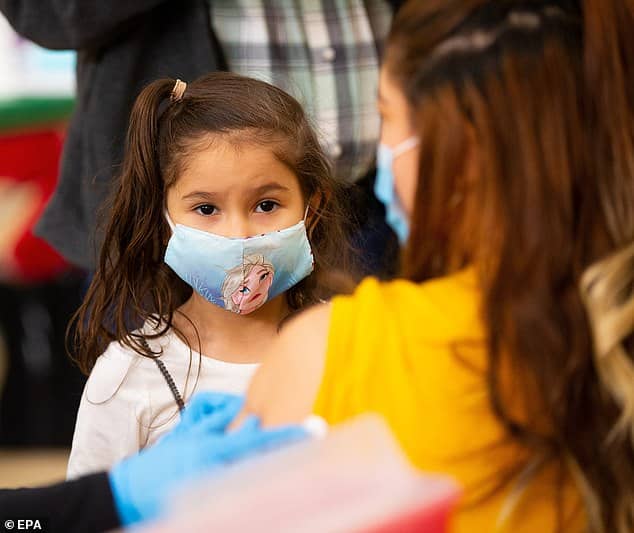
Moderna has begun dosing patients in a mid-to-late stage study of its COVID-19 vaccine in children aged six months to less than 12 years, the company said on Tuesday.
The study will assess the safety and effectiveness of two doses of its mRNA-1273 shot given 28 days apart and intends to enroll about 6,750 children in the United States and Canada.
A similar trial of the shot in children ages 12 to 17 is already underway and fully enrolled, as is one being conducted by Pfizer for children ages 12 and older.
Moderna’s vaccine has already been authorized for emergency use in Americans 18 and older.
Children have not been a high priority for vaccinations because they tend to get infected at lower rates, and COVID-19 rarely proves fatal for them.
More than 21 percent of US adults have now had one or more doses of coronavirus vaccine, and 11.5 percent of the population is fully vaccinated.
In the early days of rollout, officials were focused on the challenges of ramping up the vaccine supply and ensuring that the most at-risk people – elderly Americans, health care workers, and those with high-risk chronic conditions – got vaccinated first.
Now, as vaccine becomes more broadly available, experts have expressed concern that vaccine hesitancy could become a barrier to progress toward reaching herd immunity.

Dr Fauci and other public health officials estimate that at least 70 to 80 percent of the US population needs to have immunity through vaccination or prior infection in order to keep the virus from taking off again.
If a significant proportion of Americans remain hesitant to get vaccinated, getting shots into kids’ arms could become an important tool for keeping coronavirus at bay.
What’s more, a growing share of schools across the country are reopening as the deadline for President Biden’s goal of getting kids back to class within the first 100 days of his term approaches.
So far, children don’t appear to be significant ‘vectors’ of the disease, but the more kids are in contact with their peers and teachers, the more potential there will be for viral spread among them.
Some debate has arisen among pediatricians and medical ethicists about how important it is to vaccinate kids against COVID-19 and whether it is being done for the right reasons.
‘Vaccines for polio, diphtheria and meningitis were all geared to eliminate the most dangerous diseases in children,’ Dr Michael Hefferon, an assistant professor in the pediatrics department at Queen’s University in Ontario, told the Chicago Tribune.
‘We now have almost the opposite,’ he said of COVID-19.
‘It’s a disease of adults, and the older you get the more sinister it is. Therefore children are less relevant.’
So far, 2.57 million children 17 or younger have had COVID-19 in the US, according to Centers for Disease Control and Prevention (CDC) data.
Kids aged four and younger account for just two percent of overall case in America, while children aged five to 17 account for fewer than 10 percent of infections.
According to the CDC, 294 children have died of COVID-19, accounting for less than 0.2 percent of fatalities.
Other experts argue that because children do get sick, transmit and die from coronavirus, it remains important to vaccinate them.
‘You’ve got to be able to limit transmission by children,’ Dr Sanjay Jain, a pediatrics professor at Johns Hopkins Medicine in Baltimore told the Tribune.
‘And some children do get serious illness from the virus. Is it needed? The answer is absolutely yes.’
The first arm of Moderna’s trial, the firm will test several different doses of the vaccine in children in order to see which one is safest while revving up the right immune response.
Once the scientists home in on the best dosage, they’ll begin testing that regimen for overall efficacy in children.
Moderna has not said when it anticipates the trial will of its shot for children under 12 will conclude.
However Dr Robert Frenck, director of Cincinnati Children’s Hospital and the lead investigator for Pfizer’s pediatric trials, which are on similar timelines to Moderna’s, told the Chicago Tribune: ‘Just looking at the timelines, it’s probably more likely the end of 2021 to early 2022 for younger kids.’
In a separate study which began in December, Moderna is also testing mRNA-1273 in adolescents between 12 and 18 years old.
The latest study is being conducted in collaboration with the National Institute of Allergy and Infectious Diseases (NIAID) and the Biomedical Advanced Research and Development Authority (BARDA).
Advertise with the mоѕt vіѕіtеd nеwѕ ѕіtе іn Antigua!
We offer fully customizable and flexible digital marketing packages.
Contact us at [email protected]
















Comments are closed.